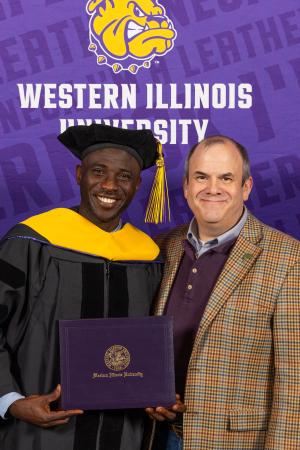University News
Sustaining Ecosystems and Inspiring Change: A Â鶹´«Ã½ Environmental Science Success Story
January 2, 2025
MACOMB/MOLINE, IL - - After years of dedicated study and groundbreaking research, Samuel Babatunde, a Â鶹´«Ã½ Illinois University (Â鶹´«Ã½) Ph.D. graduate in Environmental Science specializing in large river ecosystems, celebrated his graduation recently— marking the culmination of an academic journey rooted in passion, persistence and purpose.
For Babatunde, Â鶹´«Ã½'s Environmental Science program was an undeniable fit.
"Â鶹´«Ã½ Illinois University stood out to me because of its strong reputation in Environmental Sciences, particularly its focus on large river ecosystems," Babatunde said. "The chance to engage in research on one of the world's most iconic river systems, the Mississippi River, was a once-in-a-lifetime opportunity."
The program's unique hands-on learning approach and access to the Mississippi River played a pivotal role in shaping his research.
"The proximity to the Mississippi River was transformative for my research. It offered a living laboratory where theoretical knowledge could be directly applied to real-world challenges," Babatunde said. "Being able to study nutrient runoff, water quality and ecosystem dynamics up close allowed me to generate data that is not only academically rigorous but also practical for conservation and policy efforts."
Babatunde's dissertation focused on addressing one of the Mississippi River's most critical challenges: nutrient runoff from agricultural practices.
"My research explored how implementing cover crops could mitigate nutrient loss, enhance soil health and reduce water pollution," Babatunde said.
His findings demonstrated that sustainable farming practices could significantly improve water quality and ecosystem health.
One unexpected discovery came during his work with Kernza, a perennial grain with deep root systems.
"Our findings revealed that Kernza not only stabilizes soil but also significantly reduces nitrate runoff into water bodies," Babatunde said. "This novel application of Kernza could transform nutrient management strategies in agricultural landscapes."
Babatunde believes his research could influence policymakers, conservationists and farmers alike, offering sustainable solutions to address water quality issues.
"I hope my work serves as a foundation for promoting practices that balance food production with environmental preservation," Babatunde said.
Faculty mentorship was a cornerstone of Babatunde's academic journey.
"My advisor, Professor Roger Viadero, played an instrumental role in shaping my research and academic growth. His expertise and encouragement pushed me to challenge myself and strive for excellence," Babatunde said. "Classes like ‘Environmental Systems' and ‘Advanced Analytic Tools in Environmental Science Data' equipped me with the skills to address complex environmental challenges."
Memorable highlights of Babatunde's time at Â鶹´«Ã½ include presenting research at national conferences, where his work sparked important discussions on ecological and policy issues.
"One standout moment was presenting our project on large-scale water diversion projects. It was rewarding to see our work contribute to meaningful conversations about water scarcity and sustainability," Babatunde said.
The hands-on fieldwork along the Mississippi River, coupled with collaboration among peers, also left a lasting impression.
"The friendships I built, the mentorship I received and the time spent conducting research in such an iconic ecosystem will stay with me forever," Babatunde said.
Now that he has reached this milestone, Babatunde is setting his sights on the future. In the short term, he plans to expand the agricultural processing company he co-owns in Nigeria, embedding sustainable practices into its operations.
"My goal is to transform it into a global enterprise that operates with full compliance to environmental laws and principles," Babatunde said.
Long term, he aspires to become an influential leader in the international environmental space, contributing to global discussions on large river ecosystems and sustainable agriculture.
"I want to inspire policies and solutions that balance economic growth with environmental preservation, particularly in regions like Africa, where food security and ecosystem health are critical challenges," Babatunde said.
As Babatunde reflects on his journey, his advice for those looking to follow a similar path is not hard to find.
"Seek mentorship. Having a mentor like Professor Viadero made all the difference. Be persistent—doctoral research is challenging, but the outcomes are worth it. And embrace hands-on learning. Fieldwork connects theory to practice and enriches your understanding in ways the classroom cannot," Babatunde said.
As he crossed the stage at Â鶹´«Ã½ last weekend, Babatunde leaves behind a legacy of impactful research and a vision for a more sustainable future.
"Sam is a bright, motivated scientist who uses his considerable technical skills to help others make informed, science-based decisions vital to addressing some of the most pressing issues of our time. His work on nutrient management in agricultural drain waters is a significant step toward improving the quality of our nation's waters and enhancing the use of sustainable farming practices that can improve the economic aspects of agricultural production. While we'll miss Sam's contributions to our multidisciplinary water research team, I'm excited to see what he does next," Â鶹´«Ã½ Director, Institute for Environmental Studies and Institute for Environmental Studies Roger Viadero said.
For more information on Â鶹´«Ã½'s Environmental Science doctoral program, visit wiu.edu/cas/ies/esphd.php.
Posted By: University Communications (U-Communications@wiu.edu)
Office of University Communications & Marketing




Connect with us: